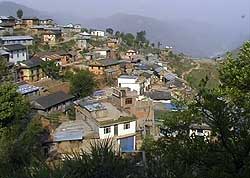 For the last seven years, Lakshina Budha has been lying to her daughter Sapana that her father, Chhat Prasad Budha, is still alive and is working in Kathmandu. She doesn't have the heart to tell her about the brutal murder of her father by a group of Maoists when she was just six months pregnant. One of the villagers had a personal grudge against Chhat Prasad and misled the Maoists at the beginning by falsely accusing him as spying against them.
For the last seven years, Lakshina Budha has been lying to her daughter Sapana that her father, Chhat Prasad Budha, is still alive and is working in Kathmandu. She doesn't have the heart to tell her about the brutal murder of her father by a group of Maoists when she was just six months pregnant. One of the villagers had a personal grudge against Chhat Prasad and misled the Maoists at the beginning by falsely accusing him as spying against them.
Around midnight, a group of Maoists entered the house and forcibly took Chhat Prasad. Two months later the Maoists announced her husband's death during a rally here. The villager achieved his personal vendetta. Lakshina became a pregnant widow at 25. Things did not stop there. Villagers constantly harassed Lakshina and forced her to leave the village. All her cows and buffaloes were slaughtered. The Maoists confiscated her house, land and all her belongings. She went to her mother's house in another village, but the Maoists traced her there. her father," she says.
Not wanting to endanger her parents, she left with a packet of rice, carried the newly-born Sapana and walked for days to Khalanga. 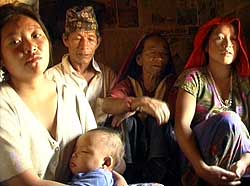 Lakshina still gets nightmares. At Khalanga, she stays in a rented house paying Rs 1,000 for one room. She can barely afford square meals and the school fees for Sapana. "I have to live for my daughter. Sapana is the only family I have. But I don't know how she will react when she grows up and finds out the truth about
Lakshina still gets nightmares. At Khalanga, she stays in a rented house paying Rs 1,000 for one room. She can barely afford square meals and the school fees for Sapana. "I have to live for my daughter. Sapana is the only family I have. But I don't know how she will react when she grows up and finds out the truth about
For Lakshina, and tens of thousands of Nepalis the ceasefire came too late. In Khalanga alone, there are about 750 displaced families. "If only this peace had taken place earlier, my son would be alive today," says a 60-year-old mother who has been bedridden for the last ten months since her son, Bir Bahadur Budha was killed during a firefight between the army and the Maoists.
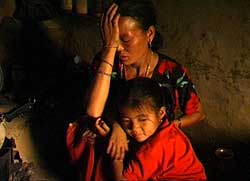 Bir Bahadur had escaped from his village when the Maoists tried to force him to join the movement. His family had to flee, leaving behind all their livestock and property. When they arrived in Khalanga, the army asked Bir Bahadur to join them as a porter and local guide. Reluctantly, Bir Bahadur joined the army patrol and traveled with them twice. He was killed on his third trip out.
Bir Bahadur had escaped from his village when the Maoists tried to force him to join the movement. His family had to flee, leaving behind all their livestock and property. When they arrived in Khalanga, the army asked Bir Bahadur to join them as a porter and local guide. Reluctantly, Bir Bahadur joined the army patrol and traveled with them twice. He was killed on his third trip out.
Post-ceasefire Rukum is full of the horror stories of relatives of the dead still trying to come to terms with tragedies and desperately surviving from day to day. It is a place of hope and dread. Hope that the peace will be real this time, and a sense of dread about what will happen if it doesn't.
Life for local residents is getting better: the income is good, shops and hotels run till late night, development projects are gradually returning, the political parties are active again, schools have restarted. But for the refugee families there are the psychological scars and the hand-to-mouth existence. The ones to suffer the most are the children, widows and the elderly parents of those killed. Rukum lost more than 700 people in the past seven years, both at the hands of the Maoists and the army. About 500 of them were non-combatants.
No one is offering any help or rehabilitation for the displaced people here. The government hasn't yet paid any of the promised compensation, and the charities haven't offered effective reintegration. The political parties are too busy holding anti-king rallies to help.
Most want to return to their villages, to plant crops when the rains come. But the Maoists are occupying their homes and fields. The Maoists have asked displaced families to come back, but the people do not trust them. Many do not believe the Maoists have given up violence, since the cadre is still extorting and intimidating subsistence farmers to feed them. Also, they remember how the Maoists forced every family to send a boy or girl for the revolution.
There is equal fear of the army: their arbitrary arrests, the torture and killings.
"Both the Maoists and the army have major responsibility to create an environment of trust and convince the people that violence and killings are not done anymore," says Bhola Mahat, regional coordinator of the human rights group, INSEC.
The Maoist leadership seems to have realised they need to do some public relations to win back the hearts and minds of the people. They have been organising public meetings and visiting them in their villages and promising help. Some 8,000 people from Rolpa and Jajarkot attended a rally at the Rukumkot airfield addressed by Deb Gurung (see pic, below).
The speeches lasted four hours, but there was not a single word of remorse or regret for the innocent victims of the peoples' war or the displaced, no offers of help to resettle or re-integrate the people. There were vague promises of how things would be better when "peoples' rule" came, and a harangue against western "imperialism", diatribes against the UML "lackeys", and predicting an Afghanistan-type conflict if the peace talks failed. If they came to offer hope, you couldn't see it in the faces of the crowd at Chaurjhari.
Two Deb Gurungs at Chaurjhari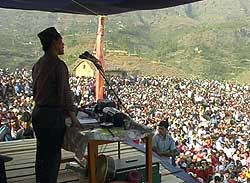
Deb Gurung is 10-years-old. And like his namesake, he says he is a Maoist: he blames the army for turning him into one.
Two years ago, when he was helping an injured Maoist with water to drink. An army patrol spotted him, and since then he has been on the run. He ended up in a Maoist camp and today speaks in Maoist jargon. He can turn serious, and stuns those around him with his mature speaking style and in-depth knowledge of Marxist theories and Maoist thought. 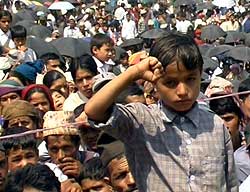
Working as a 'child representative' of the Maoists, Deb Gurung goes around villages forming Maoist's 'children associations'. Deb still goes to school and attends class six. But he says: "I have two kinds of education: Marxbadi siksha and formal education. Education is important to launch the revolution and formal education is important in dealing with international issues and agendas, the international language and modern education."
Deb says that he spends time reading Marxist books and going around talking to children explaining Maoist principles and theories. When asked about the peace talks he gives us a Maoist lal salaam (see pic, right) and asks us to give this message to the people in Kathmandu: "There should no cheating or double standards in the peace talks. The talks should be done with utmost sincerity. To make this successful, we should go ahead without any bias and dishonesty. All people and powers should be working together to make this peace talk a success."


